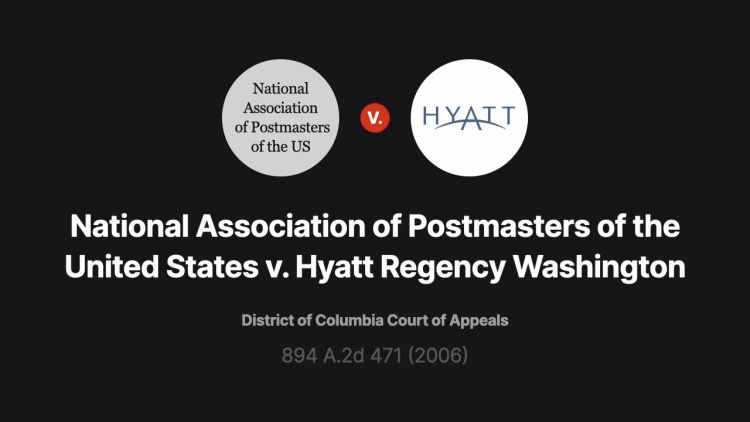National Association of Postmasters of the United States v. Hyatt Regency Washington
District of Columbia Court of Appeals
894 A.2d 471 (2006)
- Written by Lauren Petersen, JD
Facts
The National Association of Postmasters of the United States (NAPUS) (plaintiff) entered into a contract with Hyatt Regency Washington (Hyatt) (defendant) under which Hyatt agreed to provide blocks of rooms for NAPUS’s leadership conferences in February of 2002–2004. The contract contained two provisions relating to cancellation, a cancellation option and a “for cause” clause. The cancellation option allowed either party to cancel the contract and pay liquidated damages. The for-cause clause allowed a party to cancel because of acts of God, war, terrorism, disaster, or other emergencies. A party cancelling for cause did not have to pay liquidated damages. In February 2002, a federal arbitrator issued a ruling on a collective bargaining agreement. The ruling required Rural Mail Counts to be moved from September to February for the years 2003 and 2004. Many postmasters were required to attend the Rural Mail Count. Now in February, the Rural Mail Count would conflict directly with NAPUS’s 2003 and 2004 leadership conferences. NAPUS notified Hyatt of the conflict. Unable to agree on new dates and rates to reschedule the conference, NAPUS terminated its contract with Hyatt. NAPUS sought a declaratory judgment declaring that either NAPUS had cancelled the contract for cause, or that performance was impracticable. Hyatt sued for liquidated damages, claiming that NAPUS’s cancellation fell under the cancellation option of their contract. Both parties moved for summary judgment. The trial court granted summary judgment for Hyatt, awarding Hyatt liquidated damages. NAPUS appealed.
Rule of Law
Issue
Holding and Reasoning (Fisher, J.)
What to do next…
Here's why 907,000 law students have relied on our case briefs:
- Written by law professors and practitioners, not other law students. 47,100 briefs, keyed to 996 casebooks. Top-notch customer support.
- The right amount of information, includes the facts, issues, rule of law, holding and reasoning, and any concurrences and dissents.
- Access in your classes, works on your mobile and tablet. Massive library of related video lessons and high quality multiple-choice questions.
- Easy to use, uniform format for every case brief. Written in plain English, not in legalese. Our briefs summarize and simplify; they don’t just repeat the court’s language.






